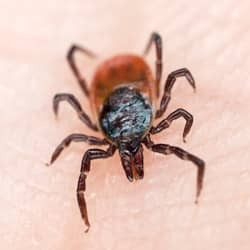It was nice having a mild winter. There were fewer days where your nose hairs turned into icicles, where your rib cage felt like Jack Frost had his fingers in between each rib, where you found yourself sliding all the way to the bottom of your driveway while putting the trash out, and where you needed to get into your car but the doors were sealed with a layer of ice. A mild winter also means less time for the expensive heat to leak out of your home, and that means more money in the bank. Mild winters are nice. But we're not the only ones who love a mild winter. Ticks love them too.
Have you ever heard of a bumper crop? It is an agricultural term that refers to a surprise increase in productive harvest. It is also a term used to describe tick populations after a warm winter.
Ticks don't hibernate. That means when temperatures are warm enough, even in the dead of winter, they will be active. In a warm winter, like the one we just had, ticks have more opportunities to breed. This increases the chances of pets and people picking up ticks this spring.
Lyme disease is a serious health risk in New England. When tick populations increase, the threat of Lyme disease increases with it-specifically when deer tick populations increase. These are the ticks that are the most significant vector for Lyme disease.
Take extra precaution if you're going to be outside in areas where there is grass. Ticks perch on grass and wait for a host creature to walk by. They then cling to the passing animal and climb up. While they prefer furry creatures, they will get on humans too.
Here are 5 ways you can prevent tick bites:
- It may look a little silly but tucking your pant legs into your socks can make it harder for ticks to bite you.
- Wear light colors so you can see ticks when they try to crawl up your clothing.
- Consider putting insect repellent on your pants and shoes.
- Treat your pets with veterinarian-prescribed products.
- Be sure to do an inspection of your skin when you return from being in nature. It takes 24-48 hours for Lyme disease to transfer from a tick.
If you're dealing with ticks inside your home, it is important to get a professional to address the issue. At American Pest Solutions, we don't just target adult ticks; we get the larva and eggs as well. Reach out to us today for immediate assistance.

